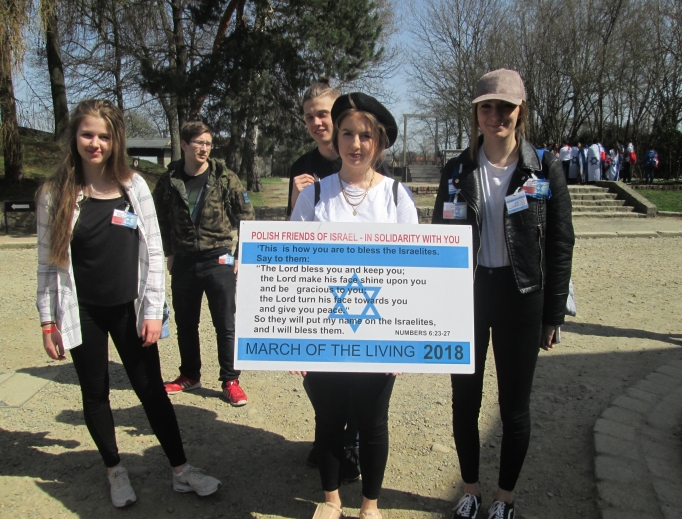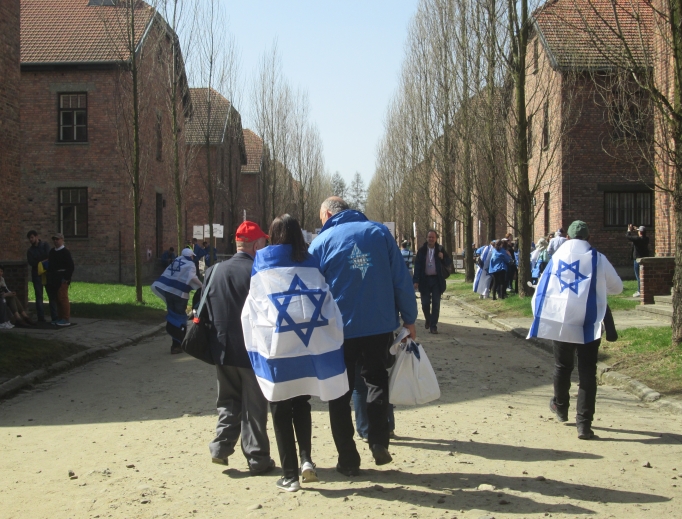New Polish Law About Holocaust Comments Generates Controversy
The law criminalizes some statements that blame Poland or Poles for cooperating with the genocide of Jews.

KRAKOW, Poland — The Catholic Church in Poland has “continued and strengthened” its relations with Polish Jews following the passage of a law that criminalizes some statements blaming Poland or Poles for cooperating with the Nazis during the Holocaust, an official with the Polish Bishops’ Conference told the Register.
“We continue to have very good relations with the Jewish people,” Father Pawel Rytel-Andrianik, spokesman for the conference, told the Register. “It is not just about commemorating events. This is day-to-day work, with a long tradition between the Jewish people, the Polish people and the Catholic Church.”
The Catholic Church has a very strong presence in Poland, where nearly 92% of the population is Catholic. More than 3 million Jews lived in the country before the Second World War and the Holocaust. Just 10,000 to 20,000 live there now.
The law, which went into effect March 1, and the subsequent wave of anti-Semitic remarks by some Polish lawmakers and media outlets, led to tensions between Poland’s Jewish and non-Jewish citizens and a diplomatic crisis between the Israeli and Polish governments.
Officials at the Yad Vashems International Institute for Holocaust Research in Jerusalem said the law could hurt scholarship into the role Poland and some Poles played during the Holocaust. One Polish Holocaust researcher has already been reassigned, Yad Vashem noted.
In February, before a visit to Poland, Israel Education Minister Naftali Bennett said he was making the trip “to tell the truth” about Polish complicity.
“I am determined to say explicitly what history has already proved — the Polish nation had a proven involvement in the murder of Jews during the Holocaust,” he said. “I came to tell the truth where the truth occurred,” Bennet said.
According to the law, anyone who “publicly and contrary to the facts” attributes blame “to the Polish nation or to the Polish state” could face up to three years in prison.
Polish President Andrzej Duda spearheaded the law to counter the impression that Poland was responsible for the Holocaust in his country. Poland was occupied by Nazi Germany during World War II. It was Nazis, not the Poles, who built death camps like Auschwitz on Polish soil.
The Nazis murdered almost all of Poland’s 3.3 million Jews and nearly 3 million other Poles.
Opponents of the law fear it will undermine free speech and Holocaust scholarship and that it seeks to erase evidence that some Poles collaborated with the Nazis by turning in their Jewish neighbors and, in some instances, actively taking part in their murders, according to scholars and the eyewitness testimony of Holocaust survivors.
At the same time, thousands of Poles, including priests and nuns, risked their lives by hiding Jews in private homes, churches and orphanages.
Reconciliation Efforts
Father Rytel-Andrianik said the Church’s long-standing efforts to promote Catholic-Jewish understanding and reconciliation has been largely inspired by the work of Pope St. John Paul II, who was born in Poland.
John Paul was the first pope to visit Auschwitz, in 1979, and, in 1986, the Great Synagogue of Rome. In 1994 he instructed the Holy See to establish diplomatic relations with Israel.
During his 2000 pilgrimage to the Holy Land, he visited Yad Vashem, Israel’s Holocaust center and memorial, and prayed at the Western Wall, one of the holiest sites in Judaism.
In March, when the law was enacted and anti-Jewish propaganda reached fever pitch, Catholic officials strongly condemned anti-Semitism.
Anti-Semitism is “a moral evil and a sin,” said Archbishop Wojciech Polak of Gniezno, the primate of Poland, in a Catholic Herald report. “Any political activity which causes divisions, prejudices or tribal thinking is dangerous.”
In a March 14 statement the Polish Bishops’ Conference recalled the words of the speech Pope John Paul II gave to the Jewish community of Warsaw in 1991.
“The nations of Christian civilization have undertaken painstaking work to uproot from their mentality unjust prejudices against Jews and other manifestations of anti-Semitism.
“In this spirit, the bishops see the necessity of continuing the Polish-Jewish dialogue based on truth, trust and mutual respect. All forms of anti-Semitism are contradictory to the principles of Christian love of one’s neighbor. At the same time there is a need for prayer for the future of Polish-Jewish relations, so that the spiritual good, developed through a joint effort of the people of goodwill, Poles and Jews, will not be lost.”
Jewish Perspectives
Chief Rabbi of Poland Michael Schudrich and Leslaw Piszewski, president of the Union of Jewish Religious Communities in Poland, said they “deeply appreciate” the bishops’ statement and their understanding of “how important it is to fight against each instance of anti-Semitism, even when it happens among the clergy, when it is extremely difficult.”
The rabbis also vowed to speak out against anti-Polish allegations by Jews — a reference to angry comments by Jews in Israel and elsewhere.
“We look forward to further deepening of our friendship and promoting brotherhood and respect for all God’s children throughout Poland,” the rabbis concluded.
In a May 1 interview with The Times of Israel, Rabbi Schudrich said that while the Polish government “was wrong” to pass the law, it “has also done very right things.”
“Their motivation is to protect their good name — it’s not to deny the Holocaust. No one in the Polish government is glorifying people that killed Jews,” he said.
Jonathan Ornstein, executive director of the Jewish Community Center of Krakow, called the law “misguided.”
“A consequence, intentional or not, will be to stifle discussion and research into the Holocaust.” The path toward understanding about the Holocaust “is through more education, not vaguely worded laws,” Ornstein said.
Some Polish communities are taking this challenge seriously.
On April 12, Polish Catholics were among the 12,000 participants in the “March of the Living,” a Polish-based Holocaust education program that culminates with a march from the site of the Nazis’ Auschwitz concentration camp to Birkenau, another camp, also known as “Auschwitz II.”


During the march, many of the Jewish participants held Israeli flags or wore flags around their shoulders.
Wojtek Losse, a Polish Catholic high-school student from Oswiecim, the town closest to Auschwitz, marched with a group of school friends. They carried placards with the English and Hebrew words of the Old Testament Priestly Blessing that begins: “The Lord Bless You and Keep You” (Numbers 6:24-26).
Asked why they had decided to participate in the march, Losse said, “The war was terrifying, and we don’t want to be quiet about it. We live in this town, and as Christians, we want to bless the Jewish people.”
Register Middle East correspondent Michele Chabin filed
this report from Poland.
- Keywords:
- michele chabin

















